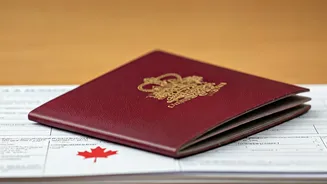Visa Types Explained
Canada offers a variety of visa options, each designed for different purposes and lengths of stay. For Indian citizens, the most common types include tourist
visas (for visiting Canada for leisure), student visas (for studying at a Canadian educational institution), and work permits (for employment opportunities). Each visa type has specific requirements, such as demonstrating sufficient funds, a clear travel itinerary, and proof of ties to India to ensure the applicant will return after their visit. The application process for each type involves different documentation and procedures, emphasizing the importance of choosing the correct visa for your intended purpose to avoid complications or delays.
Eligibility Criteria Overview
Meeting the eligibility criteria is fundamental to a successful visa application. Generally, applicants must convince the visa officer that they will leave Canada at the end of their authorized stay. This usually involves showing proof of financial resources sufficient to cover their stay, which can include bank statements, property documents, or employment letters. Other criteria include a clean criminal record, a medical examination if required, and a genuine reason for visiting Canada, such as tourism, study, or work. The specific eligibility requirements vary depending on the type of visa, and applicants should carefully review the guidelines for their chosen visa category to ensure they meet all the prerequisites.
Application Process Steps
The application process typically begins with gathering the necessary documents, which can include a passport, photographs, application forms, and supporting evidence. The next step is usually creating an online account and completing the application form accurately. Applicants often have the option to apply online through the Canadian government’s website or submit a paper application. After submitting the application, the applicant will usually need to pay the required fees. Following this, the applicant might have to attend an interview or provide biometric information, such as fingerprints and a photograph. It is crucial to be honest and provide all the requested information and documentation, as any discrepancies can lead to the rejection of the application.
Required Documentation Details
The necessary documentation forms a critical part of the visa application. Passport validity is crucial; it should be valid for at least six months beyond your planned stay in Canada. Applicants must also provide passport-sized photographs that meet the Canadian government's specifications. Financial documents, such as bank statements and proof of property ownership, should be included to demonstrate the ability to support themselves financially during their stay. For student visas, an acceptance letter from a Designated Learning Institution (DLI) is compulsory. Work permit applications require a job offer and a Labour Market Impact Assessment (LMIA) from the employer, which confirms the need for a foreign worker. Ensuring all documents are correctly prepared and submitted is essential to avoid application delays or rejections.
Addressing Common Issues
Many visa applications face similar challenges. One common issue is providing insufficient evidence of ties to India. To avoid this, applicants should include documentation that proves they have strong reasons to return to their home country, such as property ownership, family responsibilities, or employment. Another frequent problem is incomplete applications. Thoroughly reviewing all required documents and information before submission is essential. Delays in processing can also occur. Applicants are encouraged to apply well in advance of their planned travel dates. Finally, any history of criminal activity or health issues can raise concerns, so addressing these issues transparently, with appropriate documentation, is advisable to avoid application complications. Seeking professional advice from an immigration consultant can also help address potential hurdles.












